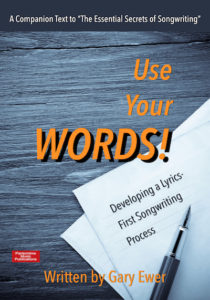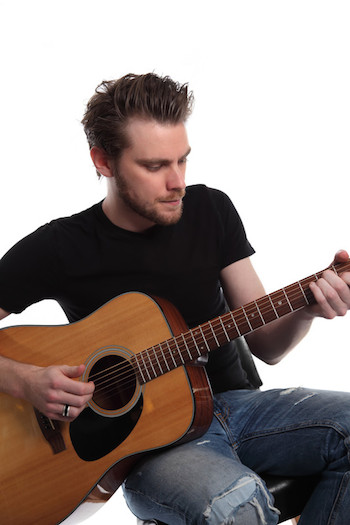Always afraid you’re copying other songwriters? Why not try it as a songwriting technique?
 “The Essential Secrets of Songwriting” 10-eBook Bundle comes with this 11th FREE eBOOK: “Use Your Words! Developing a Words-First Songwriting Process”.
“The Essential Secrets of Songwriting” 10-eBook Bundle comes with this 11th FREE eBOOK: “Use Your Words! Developing a Words-First Songwriting Process”.
 Back when I was a composition student, my favourite composers were Maurice Ravel and Charles Ives. Many are familiar with Ravel’s music, with Bolero probably being his most popular piece. You may not have ever encountered the amazing music of American Charles Ives, but I found his compositions beyond incredible, decades ahead of his time. His “The Unanswered Question” was composed in 1906, only a little more than a decade after the death of Tchaikovsky, but their music sounds a century apart.
Back when I was a composition student, my favourite composers were Maurice Ravel and Charles Ives. Many are familiar with Ravel’s music, with Bolero probably being his most popular piece. You may not have ever encountered the amazing music of American Charles Ives, but I found his compositions beyond incredible, decades ahead of his time. His “The Unanswered Question” was composed in 1906, only a little more than a decade after the death of Tchaikovsky, but their music sounds a century apart.
One day, at my weekly composition lesson, my prof laughed as he listened to the piece I was currently working on, and said that it sounded a little like a mixture of Ravel and Ives. I was a bit horrified, because I really just wanted to sound like myself, and I wondered if I was inadvertently plagiarizing something Ravel and/or Ives had composed, something I had heard before.
My prof put my mind at ease, and said that no, he wasn’t accusing me of anything, but that I had created my own unique blend of their compositional techniques.
 “Hooks and Riffs: How They Grab Attention, Make Songs Memorable, and Build Your Fan Base“ – It’s part of “The Essential Secrets of Songwriting” 10-eBook Bundle.
“Hooks and Riffs: How They Grab Attention, Make Songs Memorable, and Build Your Fan Base“ – It’s part of “The Essential Secrets of Songwriting” 10-eBook Bundle.
What about you? Do you ever fear that you are accidentally plagiarizing the music of your favourite songwriters? The good news is that you likely aren’t. Unless you purposely try to copy melodic or lyrical bits you’ve heard, you’re probably not in danger of being accused of plagiarizing. It does happen accidentally, but not as often as you might think.
And in fact, I might suggest copying your favourite songwriter’s style deliberately, as a songwriting technique. Yes, intentionally try to sound like your musical hero, whoever he/she may be.
The suggestion isn’t as daft as you might think. In fact, most great artists have spent a great deal of time as students of their genre, copying the works of great masters. There’s something powerfully instructional about watching your own “Mona Lisa” appear beneath your paintbrush. In a sense, it’s like learning as an apprentice might.
In much the same way, writing a song in the style of Springsteen is like using him as your own master, with you as the willing student. You aren’t copying an already-existing Springsteen tune, of course, but it forces you to think like him, and make the kind of decisions you think he’d make. The Beatles made no secret about the fact that they tried to copy the sound and style of Bob Dylan, The Byrds, and other influential contemporaries.
In the end, you’ll finish up with a song that will most likely sound uniquely yours, and not like your hero at all. That’s because when it comes down to it, only Springsteen sounds like Springsteen.
It’s not easy to say specifically what deliberately copying a songwriter’s style does for you. It may look like a simple matter of trying to copy the success of a greater musician, but there’s more than that happening. Trying to sound like your hero encourages you to think constantly of the end product. You’ll find that that skill will transfer to all the music you try writing – where you constantly think of the end product.
So if you live in constant fear of sounding too much like other writers, why not try doing it purposely as a songwriting technique. You’ll know if you’ve come too close for comfort, but even if you do, the benefits to your own songwriting technique make it a worthwhile exercise.
______________
 Written by Gary Ewer. Follow on Twitter.
Written by Gary Ewer. Follow on Twitter.
“The Essential Secrets of Songwriting” eBook Bundle looks at songwriting from every angle, and has been used by thousands of songwriters. How to use chords, write melodies, and craft winning lyrics. (And you’ll receive a FREE copy of “Creative Chord Progressions.“)










Pingback: Looking For a New Tried and True | The Essential Secrets of Songwriting
I find that imitating someone else’s style helps uncover little tricks I might not have noticed by just listening to them. In trying to duplicate a style, I have to break it down into the details that make up the whole. Then I can apply those lessons, in principle, to my own songwriting. Incidentally, when I write a melody I really like, I often think I’ve heard it before. I’ll wrack my brain and finally realize that I haven’t. It’s just catchy enough to feel that way. Which is good!
That’s a great way to describe what’s going on when you duplicate a style, Zen. Thanks very much for the comment.
-Gary